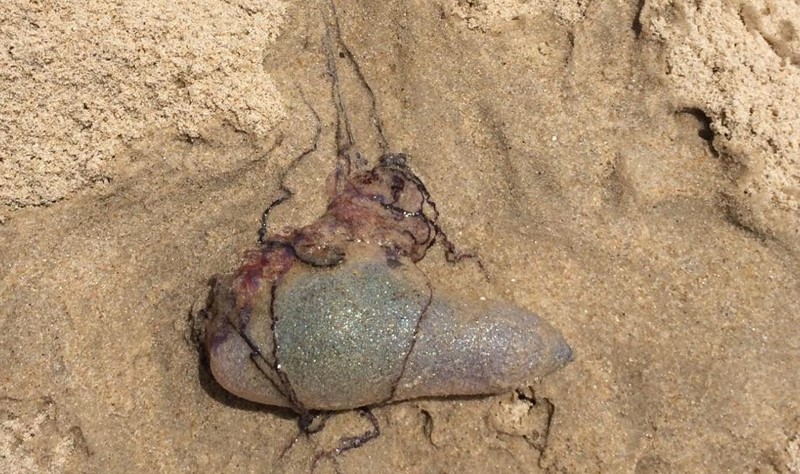
DOVER, DELAWARE (7/7/2015) Portuguese man o’ war sightings have brought a warning to Delaware beachgoers from state park officials.
Three of the stinging marine animals washed up on beaches at Delaware Seashore State Park, Fenwick Island State Park and Cape Henlopen State Park since Sunday night, according to Wayne Kline, parks chief of enforcement.
Normally native to tropical waters, these were the first Delaware sightings in 15 years.
“These are beautiful creatures that should be observed only from a safe distance,” Kline said. The man o’ war’s tentacles, which may grow to 50 feet in length, “can cause very painful – though usually non-life-threatening – stings.”
Stings from the Portuguese man o’ war cause pain that lasts up to an hour and leaves whip-like red welts on the skin for several days afterward, said Cpl. Bryan John, head of the Natural Resources Police lifeguard patrol. In rare instances, he said, stings can result in a dangerous allergic reaction, possibly even fatal.
He said help should be sought immediately if the victim exhibits any of the following:
- Trouble breathing
- Swelling of the lips or tongue
- Closure of the wind pipe
- Dizziness
- Fainting
- Vomiting, nausea or cramps
“If you are stung, seek the assistance of a lifeguard immediately,” John said. “If you are stung on an unguarded beach, acting as quickly as you can, you should remove the tentacles with a towel, stick or anything handy – avoiding further contact with bare skin – and then rinse the area of the sting with sea water. Do not rub it,” Cpl. John said.
The man o’ war can continue to inflict injury even after it has washed up on the beach and appears dead, he said.
Kline urged swimmers seeing a Portuguese man o’ war to leave the water immediately and inform the nearest lifeguard.
In the water, he said, they can seem to be an inflated purple-tinted blue balloon floating along on the ocean surface, while washed up on beach sand they may resemble a harmless duller blue plastic bag.
Great white shark makes close approach to Delaware Bay